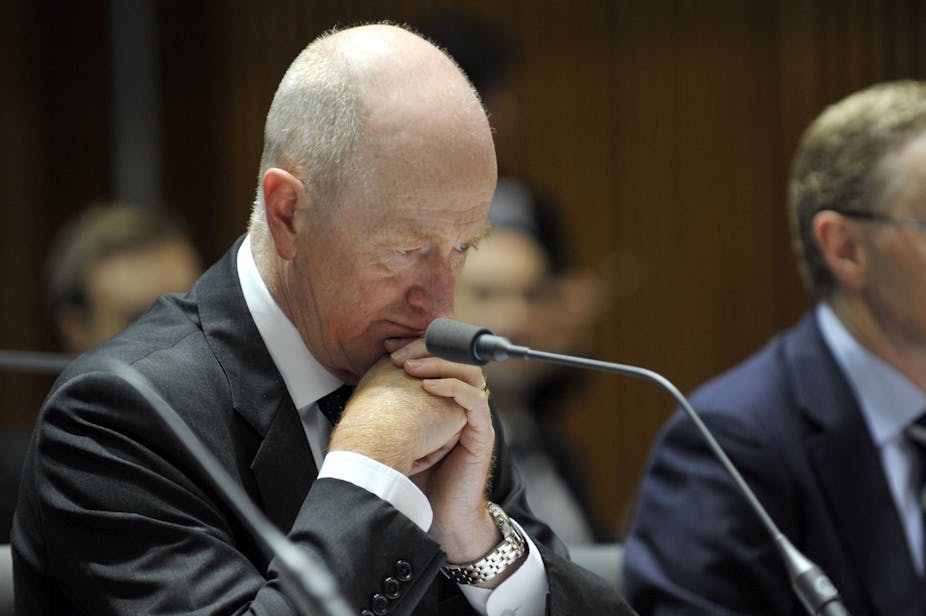The latest scandal engulfing Note Printing Australia and Securency highlights how well - or otherwise - the public sector deals with critical issues of transparency, corruption and whistleblowing.
The allegations of foreign bribery - some reportedly exposed by a whistleblower - involving RBA’s currency-making subsidiaries, Securency and Note Printing Australia, has now widened to questions over how much senior RBA figures knew and when.
At a House of Representatives Economics Committee last week, RBA governor Glenn Stevens denied a cover-up of allegations and said a lot of work had been done to improve governance at both subsidiaries.
Still, the allegations join other high-profile examples of questionable behaviour involving Commonwealth entities that goes back to 1998 and the Australian Wheat Board oil-for-food scandal, where the AWB made allegedly corrupt payments to the Saddam Hussein regime.
In 2001, Vivian Alvarez Solon, a Filipino-born Australian citizen, was wrongfully deported by the Department of Immigration, eventually returning to Australia in 2005. Meanwhile, throughout 2004 and 2005 Cornelia Rau, also an Australian citizen, was wrongfully kept in a detention centre.
In 2007, customs official Allan Kessing was convicted of breaching Commonwealth confidentiality provisions for revealing faults in airports security in 2005.
And in 2010, the home insulation installation scheme was abandoned after fires and deaths of workers. A whistleblower came forward to allege that the Department had been forewarned of the risks.
Earlier this month nurses employed by the Federal Government alleged corruption in the funding of aged care places.
All of these instances indicate serious breakdowns in governance arrangements in either Commonwealth operated or funded entities. In many of the cases cited, a whistleblower exposed the scandal; while for circumstances surrounding the AWB scandal and Ms Rau and Solon, the question arises why nobody witnessing the wrongdoing came forward and reported it.
Whistleblowing is a risky business. Australia has led the world in researching public sector whistleblowing and has documented both the scope of whistleblowing and the consequences to their actions, such as retaliation, mainly from their managers and supervisors.
That research indicates that there is a dimension of whistleblowing beyond the heroic stories that appear in the media. While many cases of whistleblowing are adequately handled, nearly a quarter of people to come forward to with reports of wrongdoing suffer retaliation. That research was conducted in a number of Australian jurisdictions including the Commonwealth.
A key mechanism for dealing with whistleblowing is legislation to encourage and protect these individuals. That is only one element of the necessary infrastructure – supervision and oversight from a powerful and well resourced integrity agency, like the Ombudsman or an anti-corruption body is also critical.
Comprehensive policies and procedures within each organisation are also needed - as well as a radical turnaround of the cultural belief to view whistleblowing not as some exceptional activity, but as a normal part of ethical administration and business.
Over the last two decades, most Australian jurisdictions have enacted whistleblower protection legislation for public sector employees. Along with the upturn in research activity, that legislation has been revised and upgraded to reflect contemporary pressures in public administration.
Most jurisdictions have involved themselves in this project, the most recent being the Australian Capital Territory which last week enacted whistleblowing legislation which provides unprecedented levels of encouragement and support for those coming forward with reports.
Not only has this legislation provided some comprehensive oversight from integrity agencies, but it has enabled channels for whistleblowers to talk to the media and still retain protection from retaliation.
It needs to be said that these national efforts to strengthen whistleblowing legislation are a work in progress and there is still a lot of room for improvement, particularly in providing protection from retaliation for whistleblowers and compensation for those who have suffered.
Without effective protection, compensation and the commitment to respect whistleblowers, those laws risk being a dangerous facade, tempting employees to come forward with reports, then leaving them exposed to damaging retaliation.
Whistleblowing research, indicates that by a considerable margin, the Commonwealth had the least comprehensive protection for whistleblowers. With the advances in other jurisdictions, the Commonwealth has fallen even further behind.
The 2009 Parliamentary Committee report into whistleblowing recommended sweeping changes to Commonwealth whistleblowing protection.
That report was accepted enthusiastically by the Government in 2010, which committed to providing “best practice legislation” that would put it ahead of every other jurisdiction in Australia.
In mid-2011 Minister Gary Gray indicated that the legislation would be finalised by the end of 2011. However, since then the Commonwealth has not progressed the matter at all.
While ever the Commonwealth dithers on the issue of providing protection for whistleblowers, we as a community are reliant upon the bravery and integrity of individual public servants to come forward with reports of wrongdoing.
Ephemeral recognition as a hero may be gratifying for those individuals, but it disguises the army of decent public servants who report wrongdoing while risking significant retaliation, sometimes involving them in the loss of their career and often irreversible adverse impacts on their personal health.all

